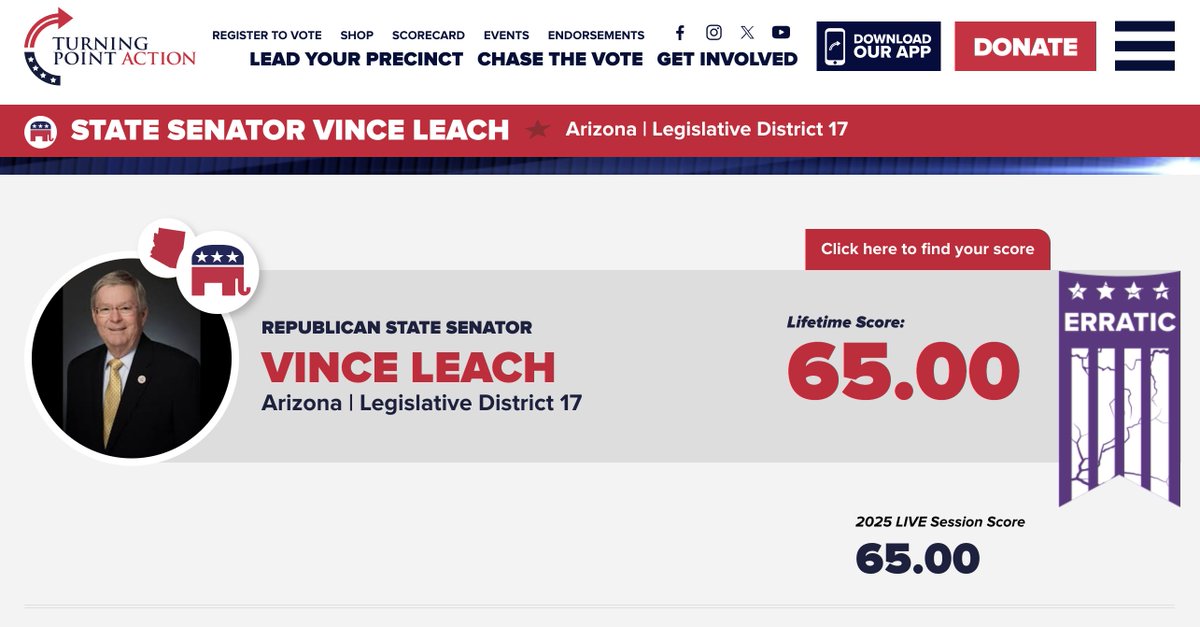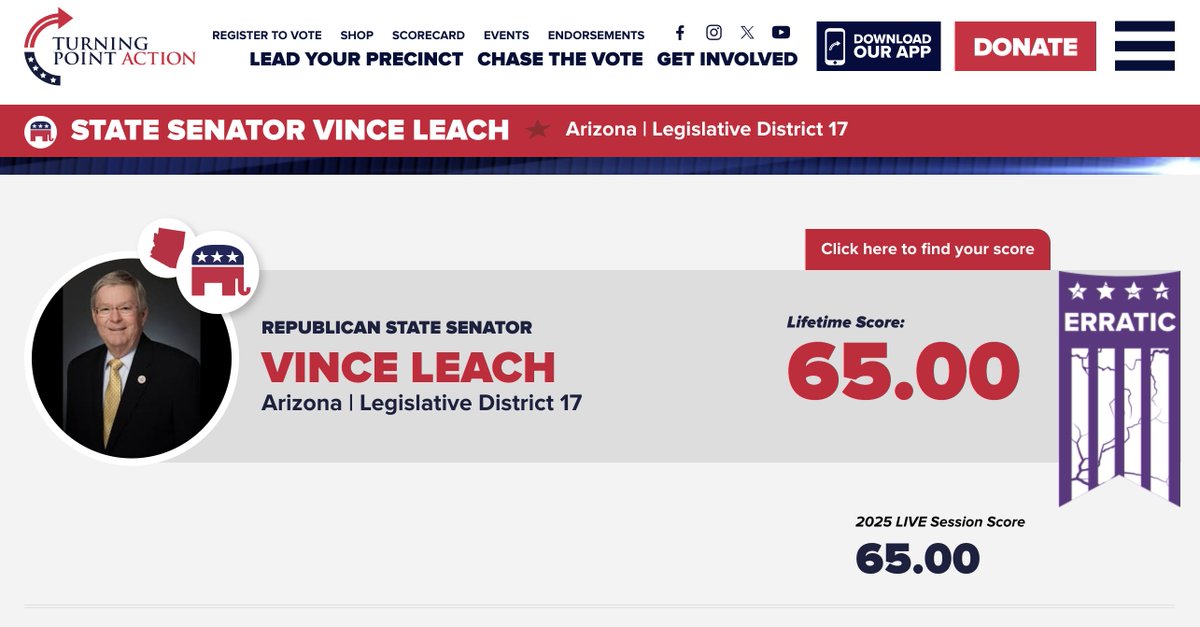AZ Senators KILL Election Bill: Controversy Erupts!
Arizona Election Integrity Alert: The Controversy Surrounding HB2045
On April 1, 2025, a significant development occurred in Arizona’s legislative landscape concerning election integrity. Arizona Senators Vince Leach and Kevin Payne made headlines by effectively killing HB2045 in the State Senate. This proposed legislation aimed to address fairness in election processes by requiring that each candidate’s name for a partisan general election ballot be rotated an equal number of times. The decision to block this bill has sparked a flurry of discussions among voters, legislators, and election integrity advocates.
Understanding HB2045
HB2045 was designed to enhance the fairness of the electoral process in Arizona by ensuring that no candidate is unfairly advantaged or disadvantaged based on the order of their names on the ballot. The rotation of candidates’ names is a method that has been discussed in various states as a means to mitigate biases that can influence voter behavior. Research has shown that the order of names on a ballot can impact election outcomes, with candidates listed first often receiving more votes simply due to their position.
By mandating that names rotate equally, HB2045 aimed to create a more level playing field for all candidates, irrespective of their political affiliation or popularity. This legislation was particularly relevant in a politically charged environment where the integrity of elections has become a focal point for public discourse.
The Repercussions of the Bill’s Defeat
The defeat of HB2045 raises critical questions about the commitment of Arizona lawmakers to ensure transparent and equitable election processes. Critics of the senators’ decision argue that by killing the bill, they are perpetuating a system that can lead to electoral imbalances. Proponents of election integrity see this as a lost opportunity to enhance trust in the electoral process, especially in a state that has experienced significant scrutiny over its election practices in recent years.
- YOU MAY ALSO LIKE TO WATCH THIS TRENDING STORY ON YOUTUBE. Waverly Hills Hospital's Horror Story: The Most Haunted Room 502
Moreover, the move has implications for the broader political landscape in Arizona. As election integrity continues to be a contentious issue, the actions of Senators Leach and Payne could influence voter sentiment and trust in the legislative process. Voters may perceive the rejection of HB2045 as a sign that their concerns about fair elections are not being adequately addressed by their representatives.
The Role of Advocacy Groups
Advocacy groups focused on election integrity have taken notice of the developments surrounding HB2045. Organizations such as the Arizona Election Integrity Coalition and various grassroots movements have been vocal in their support for measures that enhance transparency and fairness in elections. The killing of HB2045 has likely galvanized these groups, prompting them to mobilize their efforts towards raising awareness about the importance of such legislative measures.
These groups argue that fair election practices are foundational to democracy and that any efforts to undermine them can have long-lasting repercussions on voter engagement and trust in the political system. The landscape of electoral reform is often shaped by public sentiment, and advocacy groups are poised to use this moment to rally support for future legislation that promotes election fairness.
Implications for Future Legislation
The defeat of HB2045 does not necessarily signal the end of efforts to reform Arizona’s election processes. Political analysts suggest that the attention drawn to this issue may pave the way for new proposals that address the concerns raised by HB2045, albeit with different approaches or strategies. Lawmakers who prioritize election integrity may seek to reintroduce similar measures in future legislative sessions or explore alternative methods to achieve fairness in ballot design.
Furthermore, the reactions from constituents and advocacy groups could lead to increased pressure on lawmakers to prioritize election-related issues. As more voters become aware of the implications of ballot design and its effect on elections, there may be a growing demand for transparency and accountability in how elections are conducted.
Conclusion: The Ongoing Debate on Election Integrity
The recent developments surrounding HB2045 in Arizona highlight the ongoing debate about election integrity and fairness in the democratic process. The decision by Senators Vince Leach and Kevin Payne to kill the bill has sparked significant discussions that extend beyond the legislative chamber. Voters, advocacy groups, and political analysts are all closely monitoring the implications of this decision and its impact on future elections.
As Arizona continues to navigate the complexities of election laws, the importance of transparent and equitable practices remains paramount. The defeat of HB2045 serves as a reminder of the critical role that legislation plays in shaping the electoral landscape and the need for ongoing advocacy to ensure that every voter has a fair chance to participate in the democratic process. The conversation around election integrity is far from over, and the eyes of Arizona voters will undoubtedly be on their representatives as they grapple with these vital issues in the years to come.
By focusing on the need for fair election practices, advocates, lawmakers, and citizens can work together to promote a more trustworthy and equitable electoral system in Arizona and beyond.

AZ ELECTION INTEGRITY ALERT
Arizona Senators @VinceLeach and @KevinPayne4AZ just KILLED HB2045 in the State Senate!
HB2045 would have required that each candidates name for a partisan general election ballot race rotated an equal number of times.
Why are Vince Leach… pic.twitter.com/nNV23qqlmo
— TPA Scorecard (@TPAScorecard) April 1, 2025
AZ ELECTION INTEGRITY ALERT
If you’ve been following Arizona politics, you might have heard some buzz about a significant development in election integrity legislation. Recently, Arizona Senators [@VinceLeach](https://twitter.com/VinceLeach?ref_src=twsrc%5Etfw) and [@KevinPayne4AZ](https://twitter.com/KevinPayne4AZ?ref_src=twsrc%5Etfw) made headlines by effectively killing HB2045 in the State Senate. This bill aimed to require that each candidate’s name on a partisan general election ballot would rotate an equal number of times. Why does this matter? Well, let’s dive deeper into the implications of this decision and what it means for Arizona voters.
Understanding HB2045
At its core, HB2045 was designed to enhance election integrity by ensuring fairness in how candidates are presented on ballots. The proposed legislation intended to address a critical issue: the order in which candidates’ names appear on ballots can significantly influence voter choice. By rotating candidates’ names, the bill aimed to level the playing field, potentially reducing bias towards candidates who might otherwise benefit from being listed first.
The idea of name rotation is not just a theoretical concept; it’s backed by research showing that voters may unconsciously favor candidates listed at the top of the ballot. This has raised concerns about the fairness of elections and the democratic process. Advocates argued that HB2045 would promote transparency and equality in Arizona’s electoral system, but the bill’s dismissal raises questions about the state’s commitment to ensuring election integrity.
Who Opposed HB2045?
The decision to kill HB2045 was met with disappointment by many advocates for election reform. Critics of Senators Leach and Payne have voiced their concerns about why these legislators would oppose a measure designed to enhance the democratic process. While the specifics of their opposition have not been thoroughly detailed, it’s clear that this decision was not made lightly. Some speculate it could be tied to broader political strategies or party lines, which often complicate straightforward issues like election integrity.
Yet, it’s essential to consider the motivations behind such legislative actions. Are they genuinely concerned about the implications of name rotation on the electoral process, or are they prioritizing other political interests? This question is crucial for voters who want to understand how their representatives are making decisions that impact their right to fair elections.
The Broader Picture of Election Integrity
Arizona’s situation is not unique. Across the country, election integrity remains a hot-button issue. Many states have faced similar debates about how to ensure fair elections while addressing concerns about voter fraud and disenfranchisement. The landscape is complex and often fraught with tension, as different stakeholders advocate for their interests.
The rejection of HB2045 is part of a broader narrative about how election laws are shaped in our country. For instance, some states have implemented strict voter ID laws, while others have focused on expanding early voting and mail-in ballots. These discussions often devolve into partisan arguments, overshadowing the core issue: how do we create a system that is both secure and accessible?
Voter Engagement and Awareness
Given the recent developments in Arizona, it’s more crucial than ever for voters to stay informed about the legislative process and how it affects their rights. The defeat of HB2045 highlights the importance of active citizenship. Voters need to engage with their representatives, voice their opinions, and advocate for policies that promote election integrity.
Social media has become a powerful tool for raising awareness about such issues. For instance, the alert shared by [TPA Scorecard](https://twitter.com/TPAScorecard) on Twitter brought attention to the implications of killing HB2045. Platforms like Twitter can mobilize communities, allowing constituents to rally behind important causes and hold their elected officials accountable.
What’s Next for Arizona Elections?
So, what happens now? With HB2045 off the table, it’s unclear if similar measures will be proposed in the future. Advocates for election integrity will likely continue pushing for reforms, but the path forward may be rocky. The political landscape is continually shifting, and the priorities of legislators can change with each election cycle.
For voters, it’s essential to keep pressure on legislators to prioritize election reform. Engaging in grassroots movements, attending town hall meetings, and participating in local advocacy groups can amplify the push for fair election practices. The more voices that advocate for change, the harder it becomes for elected officials to ignore the call for action.
Conclusion: The Importance of Vigilance
The recent developments surrounding HB2045 serve as a reminder of the delicate balance between political interests and the principles of democracy. As Arizona navigates these challenges, voters must remain vigilant and proactive in advocating for their rights. Election integrity is not just a political issue; it’s a fundamental aspect of our democracy that affects every citizen.
If this topic resonates with you, consider reaching out to your local representatives, joining community discussions, or even sharing information on social media. Your voice matters, and it can contribute to a more transparent and fair electoral process in Arizona and beyond.
Stay informed, stay engaged, and remember that every vote counts. The fight for election integrity is ongoing, and it’s up to all of us to ensure that our democratic system remains strong and fair for generations to come.

